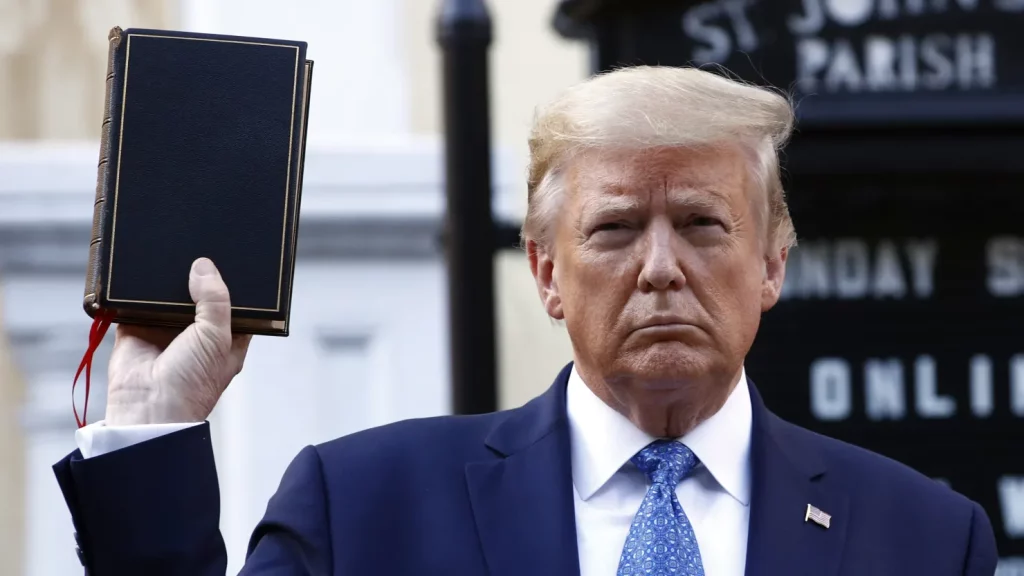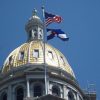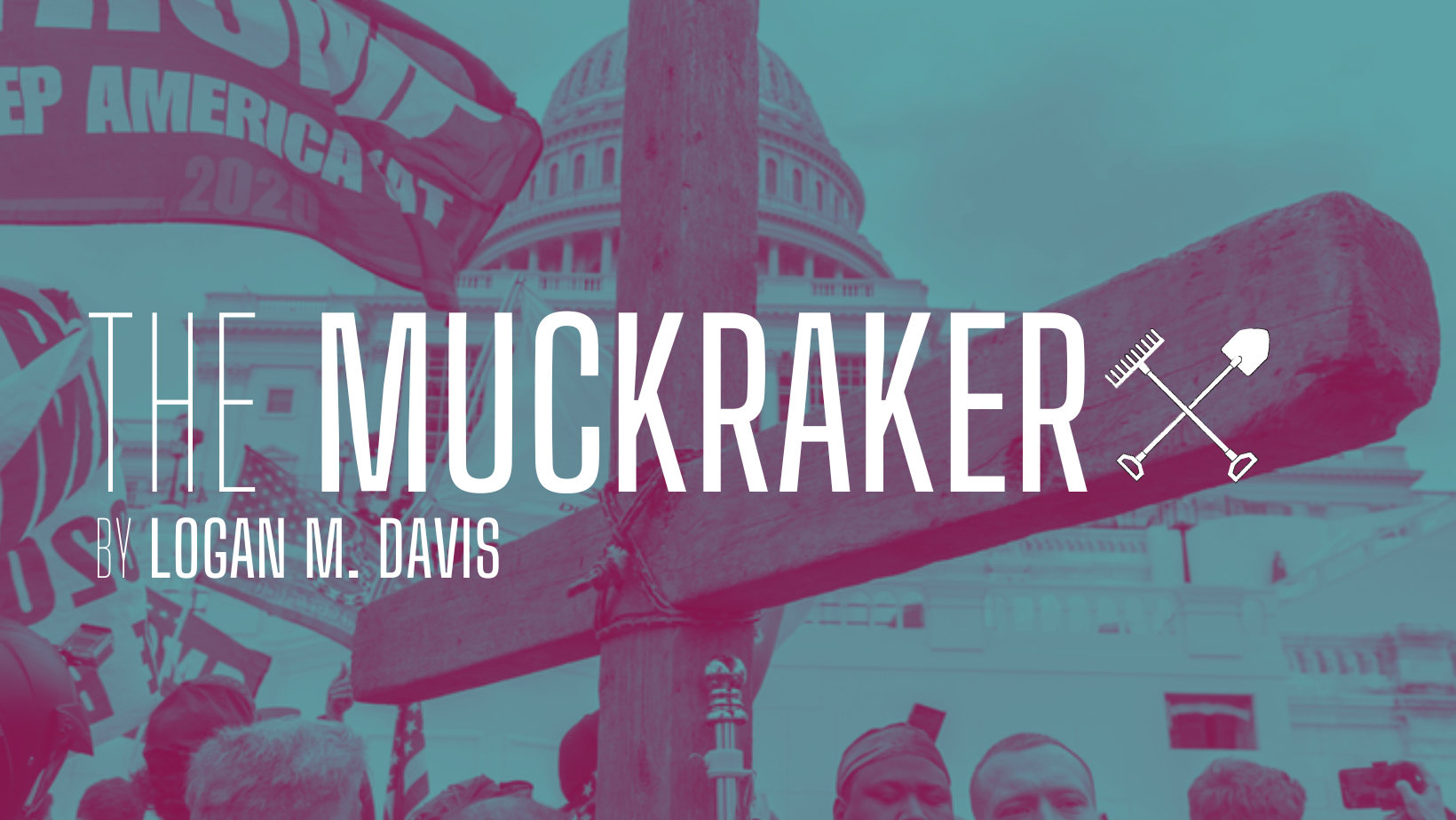I was raised to take over the world for God. My teachers have been sorely disappointed on that front. It is not something I spend much time talking about because it’s not something I spend much time thinking about. It was the milieu of my childhood, and I had no say in the matter. As a pastor’s kid from Nashville, Tennessee, I was steeped in religious conservatism from birth. The impetus towards a highly political, far-right version of Christianity which seeks to conquer the world for Christ, though, didn’t come from my family so much as it came from my classical Christian school. We were taught that we were special, that the world was fallen and we could redeem it. We were taught that America was a Christian nation which had drifted off course, but that a faithful generation could restore it.
As often happens with children raised to see the world a certain way, I grew up, put off childish things, and came to see the world in a different way entirely. I left evangelicalism, conservatism, and Nashville behind. I built a life for myself out west, and spent the better part of a decade sparing little thought for the community that raised me. After all, they were the fringe; I’d chosen to live closer to the mainstream.
Then I flipped on the television one Wednesday in early January 2021 and my stomach turned over: the crowd besieging the Capitol was not just wearing MAGA hats and carrying Trump signs. They were decked-out in Christian imagery, flying ‘An Appeal To Heaven’ flags. Multiple life-sized wooden crosses were carried through the crowd, one of them ending up near the gallows the crowd erected. As a child, I was taught to look forward to that glorious moment when we took back the country for god; I never knew how to picture it until I saw it on TV that day. Now I’ll never forget it.

In the three years since the January 6th insurrection, “Christian nationalism” has become a buzzword, bandied-about with no clear definition. Some have dismissed it as nothing, or a smear against Christian conservatives. Others have asserted that it is the single biggest threat to religious freedom in America and the future of the republic. Having spent the first half of my life steeped in Christian nationalism, and a large portion of the second half studying, analyzing, and working against right-wing extremist groups, I side with the latter camp. Buzzword or not, Christian nationalism presents a clear and present danger to the preservation of American democracy – not just because of what it is now, but because of what it’s on its way to becoming.
Christian nationalism is not new, and it is not distinctly American. In many ways, it’s not even distinctly Christian. Rather, it’s a subset of religious nationalism, which has manifested in different times, places, and faiths. And everywhere it manifests, democracy is imperiled. The greatest threat to Indian democracy at this moment, for instance, is not Christian nationalism, but Hindu nationalism. The Hindutva ideology promoted by Indian Prime Minister Narendra Modi’s Bharatiya Janata Party relentlessly depicts India as a country for Hindus, leading a drumbeat of rhetoric and government action which has subjected the country’s 200 million Muslims to hostility, threats, and violence.
In the United States, Christian nationalism is an attempt to merge American identity with Christian identity. Like Hindutva attempts to define being Indian as being Hindu, Christian nationalism seeks to make being American effectively synonymous with being Christian.
The problem in America is not Christianity; the problem in India is not Hinduism. In both democracies, the problem is ultranationalism: far-right ideologues attempting to forcibly define which people a nation is – and is not – for. Religion is employed as a tool towards that end.
It’s less accurate to think of Christian nationalism as a coherent belief system than as a movement; a joint venture between religious and political actors seeking power. It is a marriage between the sacred and the profane, with hoped-for mutual benefits. The political actors believe that their embrace of religion will provide a constituency to bring them to power; the religious actors believe that having friends in power will empower them as well, and protect them from perceived persecution. Sociologist and scholar of Christian nationalism, Andrew Whitehead, frames Christian nationalism as a “political theology” used by a social movement to “baptize their political ends with the support of the transcendent.”
Though most Christian nationalists do not apply the label to themselves, their movement is real, and they represent a prominent faction in American life. Organizations like the Public Religion Research Institute have gone to great lengths to study, quantify, and categorize Christian nationalist beliefs. In February 2023, PRRI estimated that roughly 1-in-5 American adults adhered to a Christian nationalist worldview, and that more than half of Republicans either adhered to or were sympathetic towards Christian nationalism.
Not all Christian nationalists believe the same thing, especially on the Christian side of the equation. They are Baptists, Presbyterians, Methodists. They are non-denominational charismatics. Some are even Catholic (but most aren’t). Their theological backgrounds vary widely – it’s only been a few centuries since some of these groups were killing each other – but they have coalesced around a shared political vision which is, ostensibly, dictated by their faiths. This is because of what they do have in common: Christian nationalists are overwhelmingly white, evangelical, and Republican. What they are embracing in Christian nationalism is not an ideology, it’s an identity.
Despite their theological differences, despite their movement being more a white ethnocultural phenomenon than a consistent ideology, Christian nationalists in America do share a set of underpinning beliefs: that America is “a Christian nation,” and that Christians in America are being persecuted.
Neither is true, but both are believed ardently. According to a 2022 Pew survey, 81% of white evangelical protestants believe that the “founders originally intended the United States to be a Christian nation,” and that “the United States should be a Christian nation.” 65% of white evangelical protestants in the same survey responded that the Bible should have more influence than the will of the people in dictating laws. A study by the Brookings Institution and PRRI shows that a majority of American Christians believe that they are persecuted. The last Congress, meanwhile, was 88.1% composed of self-identified Christians, leaving some doubt as to who is doing all of this persecuting.
Importantly, not all American Christians share the beliefs underpinning Christian nationalism: though Pew found that 65% of white evangelical protestants believe that the Bible should trump democracy in lawmaking, that figure fell to 38% amongst all American Christians. In fact, various Christian organizations and entities – from Christianity Today magazine to the Baptist Joint Committee for Religious Liberty – have helped lead the charge against Christian nationalism.
“We are concerned not only about the threat of Christian nationalism to American democracy but also its threat to Christianity itself,” said Amanda Tyler, executive director of the Baptist Joint Committee. “Christian nationalism, which merges political and religious authority, can quickly lead to idolatry and a confusion of allegiance.”
The threat of Christian nationalism is not a vague, faraway thing, of concern only as it manifests in national politics. In fact, Colorado is required to contend with the movement on a more regular basis than many other states, thanks in large part to the prominent outposts of Christian nationalism based in El Paso and Teller Counties: Focus on the Family, James Dobson, Andrew Wommack Ministries, Charis Bible College, and many others. A small but powerful sector of the Front Range economy is built on selling the Christian nationalist worldview. And business is booming: in 2020, the most recent year for which it has released tax documents, Andrew Wommack Ministries reported more than $48 million in contributions for the year.
So what do Christian nationalists want? They want the country as it existed on Leave it to Beaver: white, patriarchal, and heteronormative. PRRI’s extensive research in 2023 showed a series of strong correlations between Christian nationalism, anti-Black racism, and traditional patriarchal gender roles. According to PRRI, 85% of Christian nationalists believe that discrimination against white Americans is as big of a problem as discrimination against Black Americans, while 83% of Christian nationalists disagree with the assertion that “generations of slavery and discrimination have created conditions that make it difficult for many Black Americans to work their way out of the lower class.” Meanwhile, 69% of Christian nationalists, according to PRRI’s data, believe that a wife should submit to a husband’s leadership, while 66% believe that “society as a whole has become too soft and feminine.”
By prioritizing a specific ethno-religious identity, these beliefs are fundamentally opposed to the idea of a pluralistic, multi-ethnic, multi-sectarian society in which people are free to believe and identify as they wish. They are beliefs indicative of a desire, as Yale scholar Philip Gorski put it, to “restore and privilege the myths, values, identity, and authority of a particular ethnocultural tribe.” These beliefs, according to Gorski, “add up to a political vision that privileges the tribe, and they seek to put other tribes in their proper place.”
Like any movement, Christian nationalism is not static. While its current incarnation is already a threat to our shared democratic principles, the trend line it is following – the thing this jumble of identitarian grievances promises to evolve into – is a threat to democracy itself.
Some have called it post-liberalism, or political protestantism. In Catholic teachings, it’s called integralism – and, despite most American Christian nationalists being protestants, I’ve yet to find a better term. Call it what you will, it’s the future of Christian nationalism in America, and it is cause for concern.
These terms have exploded in popularity across the right-wing blogosphere in recent years (yes, they still blog). Though there are fine-line distinctions between the respective ideologies described by the terms – “post-liberalism” and “integralism” are not synonyms, but they are siblings – these beliefs share an important defining trait: they are undemocratic. I do not mean that as a value judgment, I mean it literally. Large swaths of the conservative intelligentsia have set their sights on a future political system in which the obstacle of democracy will be removed.
Christian nationalists have a vision for the America they want. The problem, as they increasingly see it, is that the majority of voters do not agree with them. Rather than turning their backs on that vision, which they see as divinely appointed, Christian nationalists are set to turn their backs on democracy. The willingness to do so was made undeniable on January 6th, but the lack of logistics and foresight doomed the effort.
More and more, Christian nationalists are accepting that their vision will not become a reality without an authoritarian strongman. In 2016, Southern Baptist pastor Robert Jeffress made this explicit, saying that the government’s purpose is to be “a strongman to protect its citizens against evildoers…I believe that’s biblical.” The influential conservative legal scholar Adrian Vermeule has spent years advocating for the integration of church and state, proselytizing for a future in which the state operates based on religious values. He promotes a strategy by which “nonliberal actors strategically locate themselves within liberal institutions and work to undo the liberalism of the state from within.”

This is not a faraway prospect. The lights on the control panel are already flashing red.
A 2022 study found that roughly one-third of Americans supported the idea of “a strong leader who doesn’t have to bother with Congress or elections.” An October 2023 poll by the University of Virginia Center for Politics showed that a large portion of respondents were open to the idea of exploring alternatives to democracy in order to “ensure stability and progress.” According to Democracy Fund, the situation is even more dire: earlier this month, the organization released findings showing that only 27% of Americans “consistently and uniformly support democratic norms,” including 45% of Democrats but only 13% of Republicans.
If Christian nationalists were to take power again, what’s to say they would ever give it back? When they are told, wrongly, that the choice is between God and democracy, why would they choose democracy?
The threat is real: Christian nationalism, a palpable force in American politics, is well on its way to becoming an openly anti-democratic political movement on a scale the United States has never seen. The consequences could be dire, from self-coup to civil war. According to political scientist Barbara F. Walter, neither is inevitable, and neither is off the table.
“There are definitely lots of groups on the far right who want war. They are preparing for war,” Walter told the Washington Post. “We know the warning signs. And we know that if we strengthen our democracy, and if the Republican Party decides it’s no longer going to be an ethnic faction that’s trying to exclude everybody else, then our risk of civil war will disappear.”
Even if it does not come to violence – as we must all hope that it doesn’t – a whole host of things we were told could never happen here are now firmly in the realm of possibility. The old world is dying, and we are living in the days which will shape the new one. Trump is on the ballot. Theocracy is on the move. Tens of millions of Americans are clamoring for a strongman unencumbered by elections or Congress. We are staring down the barrel, as unrealistic as it sounds, of elections which could be the last of their kind, and we are left to face them with nothing but organizing and hope. It’s too late for much else at this point: we have failed to take meaningful action during the brief reprieve we have been granted. Even after the threat made itself known, our leaders failed to prioritize democratic reforms. Even as red states curtailed voting rights for millions of people in the years following January 6th, our leaders failed to pass federal voting rights reform. Even as a quasi-legitimate Supreme Court stripped the bodily autonomy of half the population while descending into multiple simultaneous ethics scandals, our leaders failed to prioritize judicial reform. All we can do now is organize and hope, because we have not been given any other options.
We have never been here before, and there is no guarantee that we will emerge unscathed. If we do, though – if we make it through the 2024 election and the subsequent years with American democracy intact – there are hard conversations to be had about how we got here; about how to stop the republic from ever reaching a place of such precarity again; about how to make the promises of democracy real for everyone, that future generations might not also be tempted by the promises of force.
A note: Since November, I have been working on a long-running investigation for the Muckraker column, dealing with one of Colorado’s most prominent outposts for Christian nationalism. I hope to share some of my findings with you in the coming weeks. In the meantime — and as I work on new investigations going forward — I will publish opinion and analysis pieces under my byline.




